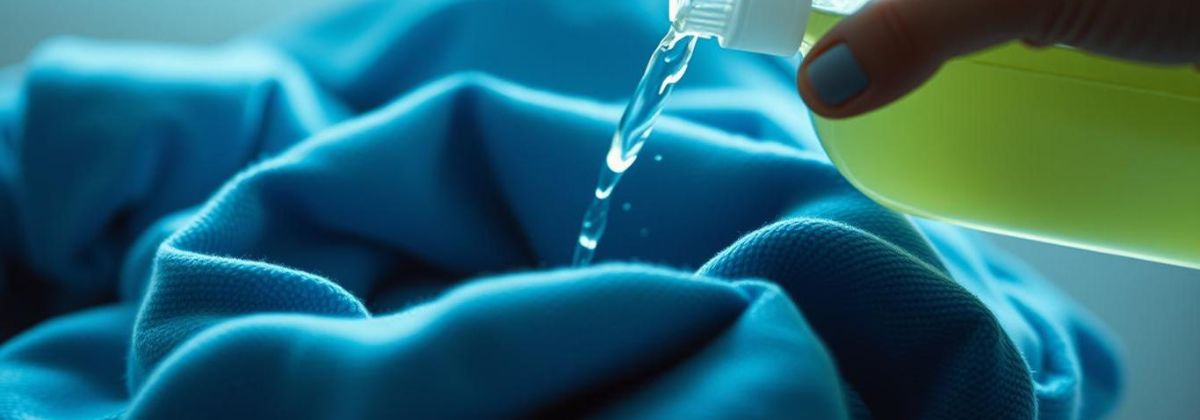19 Aug Surprising Benefits of Using Dish Soap in Laundry: The Ultimate Stain-Fighting Secret
Dish soap is a staple in most households, primarily used to clean dishes and cut through grease. However, its versatility extends far beyond the kitchen sink. One of the lesser-known but highly effective dish soap uses is in the laundry room. Yes, you heard that right! Dish soap can be a handy alternative or supplement to traditional laundry detergent. Whether dealing with stubborn stains, looking to brighten your whites, or simply out of detergent, dish soap can come to the rescue.
Why Use Dish Soap in Laundry?
Using dish soap in laundry might seem unconventional, but it offers several advantages that make it a handy alternative to traditional laundry detergent in certain situations. Here’s why you might consider reaching for the dish soap next time you do a load of laundry:
- Effective on Grease and Oil Stains: Dish soap is formulated to cut through grease and oil on dishes, making it equally effective at tackling greasy stains on clothing. Whether it’s food spills, makeup, or any other oil-based stain, dish soap can help lift the stain from fabric fibres, making it easier to wash.
- Cost-Effective Solution: Dish soap is generally less expensive than laundry detergent, especially when used in small amounts. This makes it a budget-friendly option, particularly for small loads, spot cleaning, or running out of your regular detergent.
- Versatile Cleaning Agent: Dish soap can be used for various laundry tasks beyond removing stains. It can brighten whites, eliminate odours, and even hand-wash delicate fabrics. Its versatility makes it a useful tool to have in your laundry arsenal.
- Gentle on Fabrics: Mild dish soaps, especially those formulated for sensitive skin, are gentle on fabrics and can be used safely on delicate items like silk, lace, or wool. This makes dish soap a good option for hand-washing items that require special care.
- Convenience: If you’re in a pinch and are out of laundry detergent, dish soap can be a convenient backup. A small amount added to your wash cycle can help clean your clothes effectively without needing an emergency trip to the store.
While dish soap shouldn’t replace your regular detergent for everyday laundry, it’s a versatile and cost-effective solution for specific needs, making it a valuable addition to your cleaning routine.
Types of Dish Soap Suitable for Laundry
When considering dish soap for laundry use, choosing the right type is important to ensure your clothes are cleaned effectively without causing any damage. Here are the types of dish soap that are most suitable for laundry:
Mild Dish Soaps:
- Sensitive Skin Formulas: Dish soaps designed for sensitive skin are generally mild and free from harsh chemicals. These are excellent for laundry use, especially when washing delicate fabrics or clothing for people with sensitive skin. Brands like Dawn Free & Clear or Seventh Generation are good examples.
- Fragrance-Free Options: Fragrance-free dish soaps are another good choice, as they contain fewer additives that could potentially irritate the skin or leave residues on clothes. These are ideal for people sensitive to strong scents or prefer a more neutral cleaning agent.
Eco-Friendly Dish Soaps:
- Biodegradable Formulas: Eco-friendly dish soaps, often labelled as biodegradable, are made with natural ingredients that break down easily in the environment. These soaps are less likely to contain phosphates or other harsh chemicals, making them a safer choice for your clothes and the planet.
- Plant-Based Ingredients: Dish soaps made from plant-based ingredients are gentle on fabrics and environmentally responsible. These soaps are typically free from synthetic dyes and perfumes, reducing the risk of skin irritation or fabric damage.
Clear or Lightly Coloured Dish Soaps:
- Avoid Strong Colours: Clear dish soaps are preferable for laundry as they are less likely to cause any dye transfer onto your clothes. Strongly coloured dish soaps may contain dyes that could stain lighter fabrics, so it’s best to opt for more neutral options.
Dish Soaps to Avoid:
- Antibacterial Dish Soaps: These often contain additional chemicals, such as triclosan, that are unnecessary for laundry and could leave residues on fabrics. These soaps are special for killing bacteria, which is unnecessary for washing clothes, and the additives could be harsh on fabrics.
- Heavily Fragranced Soaps: While some people enjoy the scent of fragranced dish soaps, these products often contain added chemicals that can irritate the skin and may leave lingering odours on clothing. Additionally, the strong scents may interfere with the effectiveness of your laundry routine, especially when combined with other scented products.
How Dish Soap Works in Laundry
- Surfactants and Their Role: Surfactants are the key ingredient in dish soap that makes it effective for laundry. Surfactants are compounds that lower the surface tension of water, allowing it to spread and penetrate fabrics more easily. This helps to lift and remove dirt, grease, and stains from the fibres of your clothes.
- Cutting Through Grease and Oil: Dish soap effectively tackles grease and oil on dishes and removes greasy stains from clothing. When applied to oil-based paint, dish soap breaks down the grease into smaller particles that can be washed away with water. This makes it particularly useful for spot-treating stains like food spills, makeup, or motor oil.
- Enhancing Water’s Cleaning Power: Dish soap reduces water’s surface tension, allowing the water to penetrate deeper into the fabric fibres. This enhanced penetration helps dislodge dirt and grime that might otherwise be trapped in the fabric. The result is cleaner clothes with fewer residues.
- Producing Lather and Bubbles: Dish soap is known for producing a lot of lather, which helps trap and suspend dirt and grease particles in the water. While lather isn’t necessary for cleaning, it does keep the dirt away from the fabric as it’s rinsed out. However, it’s important to use only a small amount of dish soap in laundry, as too much lather can be difficult to rinse out and may cause issues in your washing machine.
Best Uses in Laundry:
Dish soap is most effective when used for small, specific tasks in laundry. These include:
- Spot Treatment: Applying dish soap directly to a stain before washing can help to remove it more effectively.
- Hand-Washing Delicates: Dish soap is gentle enough for hand-washing delicate items, especially greasy stains.
- Quick Fixes: If you run out of detergent, a small amount of dish soap can be used in a pinch for a small load of laundry.
Stain Removal with Dish Soap
Dish soap in the laundry is a powerful ally in the battle against stubborn stains on clothing. Its grease-cutting abilities and versatility make it an excellent choice for tackling various stains. Here’s how to effectively use dish soap for stain removal:
Pre-Treatment of Stains:
- Direct Application: For best results, apply a small amount of dish soap directly to the stain before washing. Gently rub the soap into the fabric using your fingers or a soft cloth, focusing on the stained area. This allows the dish soap to penetrate the fibres and break down the stain.
- Let it Sit: After applying the dish soap, let it sit for 5 to 10 minutes. This gives the soap time to break down the stain before you wash the garment. However, avoid letting it sit too long, as some dish soaps may discolour certain fabrics if left on for an extended period.
Removing Grease and Oil Stains:
- Effective on Oily Residues: Dish soap is particularly effective at removing grease and oil stains, such as those from cooking, salad dressings, or makeup. Its formulation is special for cutting through grease, breaking it down so it can be easily washed away.
Rinsing the Area: After treating the stain with dish soap, rinse the area with warm water. This helps to flush out the loosened grease and prevent it from spreading to other parts of the fabric.
Dealing with Food Stains:
- Sauce and Gravy Spills: Dish soap breaks down the oily and non-oily components of stains from foods like sauces, gravies, or soups. Apply dish soap, rub it gently, and then rinse before washing.
- Fruit and Vegetable Stains: While dish soap is great for greasy stains, it can also help with fruit or vegetable stains. However, for particularly stubborn stains, you might need to follow up with a stain remover designed for tannin-based stains.
Using Dish Soap on Delicate Fabrics:
- Gentle on Delicates: Dish soap can safely remove stains from delicate fabrics like silk, wool, or lace. Just test a mild, fragrance-free dish soap on a small, inconspicuous area first.
- Hand-Washing Method: For delicate items, it’s best to apply dish soap, gently rub the stain, and then rinse under cold water before hand-washing the entire garment.
Ink and Dye Stains:
- Initial Treatment: While dish soap is not always effective on ink or dye stains, it can help reduce the severity of the stain. Apply dish soap, rub gently, and rinse. However, these types of stains often require specialised stain removers for complete removal.
Avoiding Residue:
- Proper Rinsing: One key thing to remember when using dish soap for stain removal is to rinse the fabric thoroughly after treatment. This ensures that no soap residue remains on the fabric, which could lead to discolouration or stiffening of the material.
Follow-Up with Regular Washing:
- Laundry Cycle: After treating the stain with dish soap and rinsing it, wash the garment as you normally would. This helps to remove any remaining soap and ensures the stain is completely lifted.
The Last Word
Dish soap is a surprisingly versatile tool in the laundry room, offering an effective alternative to traditional laundry detergents in certain situations. Whether you’re tackling tough stains, brightening whites, or need a quick spot clean, dish soap can be a valuable addition to your laundry routine. However, it’s important to use it correctly to avoid potential issues like excessive suds or residue. With the right approach, dish soap can help you achieve cleaner, fresher clothes without breaking the bank.




Sorry, the comment form is closed at this time.